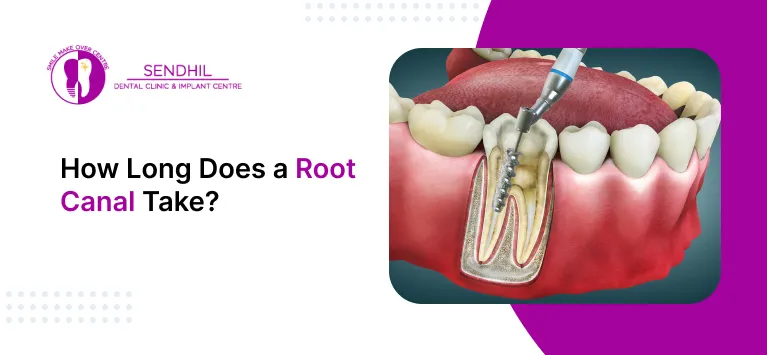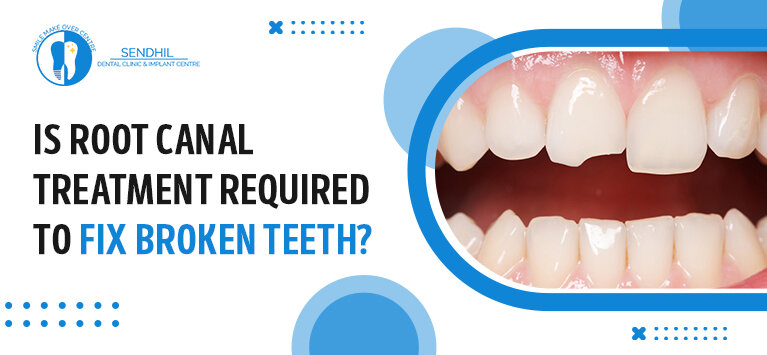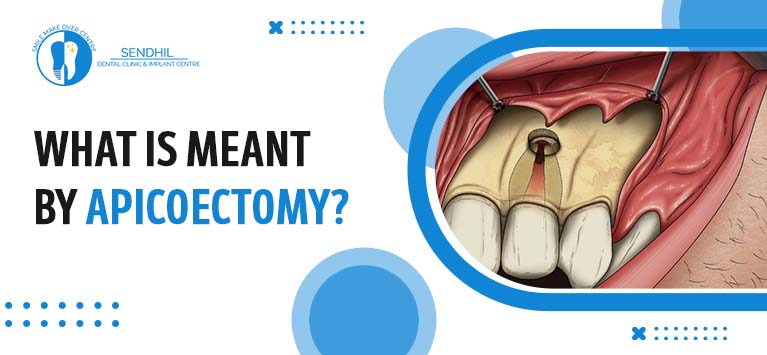
How Long Does a Root Canal Take?
A root canal is a dental procedure aimed at treating infection or damage within the tooth’s pulp—the innermost part containing nerves and blood vessels. Understanding the duration of this procedure can help alleviate concerns and prepare patients for what to expect. In this blog, we’ll explore the factors influencing the length of a root canal, the procedure itself, associated costs, recovery, and preventive measures.
Table of Contents
What Is a Root Canal?
A root canal is a treatment designed to eliminate bacteria from the infected root canal, prevent reinfection, and save the natural tooth. During the procedure, the inflamed or infected pulp is removed, and the inside of the tooth is carefully cleaned, disinfected, filled, and sealed. This process helps preserve the tooth’s structure and function.
What Causes Root Canal Issues?
Several factors can lead to the need for a root canal, including:
- Deep Decay: Untreated cavities that penetrate deep into the tooth can reach the pulp, causing infection.
- Repeated Dental Procedures: Multiple procedures on the same tooth can stress the pulp, leading to inflammation.
- Cracks or Chips: Damage to the tooth can expose the pulp to bacteria.
- Trauma: Physical injury to a tooth may harm the pulp even without visible cracks.
Recognizing these causes can aid in early intervention and potentially prevent the need for a root canal.
How Long Does a Root Canal Procedure Take?
The duration of a root canal procedure varies based on several factors:
- Tooth Type: Front teeth (incisors and canines) typically have a single root canal and may take about 30 to 60 minutes. Premolars, with one or two canals, might require a similar duration. Molars, having up to four canals, can take approximately 90 minutes or more.
- Complexity: Teeth with complex root structures or severe infections may necessitate longer treatment times.
- Number of Visits: While many root canals are completed in one visit, some cases, especially those requiring additional restoration like crowns, may need two or more appointments.
Understanding these factors can help set realistic expectations for the procedure’s length.
Are Root Canals Painful?
A common concern is the pain associated with root canals. However, with modern anesthesia and techniques, the procedure is comparable to having a cavity filled. The discomfort experienced before the procedure due to infection is often more significant than any pain during or after the treatment.
Post-procedure discomfort is typically mild and can be managed with over-the-counter pain relievers.
How Much Does a Root Canal Cost?
The cost of a root canal varies based on factors such as the tooth’s location, the complexity of the procedure, and the geographic region. Front teeth are generally less expensive to treat than molars due to their simpler structure. Dental insurance often covers a portion of the cost, but it’s advisable to consult with your provider for specific coverage details.
Root Canal Before and After
Undergoing a root canal can significantly improve oral health and alleviate pain. Before the procedure, patients may experience severe toothache, sensitivity, and swelling. After treatment, these symptoms typically subside, and the tooth functions normally. Maintaining good oral hygiene and regular dental check-ups can ensure the longevity of the treated tooth.
How to Avoid Root Canal Treatment?
Preventive dental care is key to reducing the risk of needing a root canal:
- Regular Brushing and Flossing: Maintain oral hygiene to prevent decay.
- Routine Dental Visits: Early detection of issues can prevent progression to pulp infection.
- Protective Gear: Use mouthguards during sports to prevent dental injuries.
Adopting these practices can help maintain healthy teeth and gums.
How Long Does It Take to Recover from a Root Canal?
Recovery time is generally short. Most patients return to normal activities the next day. Mild discomfort or sensitivity may persist for a few days but can be managed with prescribed or over-the-counter pain medications. It’s important to follow your dentist’s post-procedure care instructions to ensure proper healing.
Signs of Infection After Root Canal
While rare, post-procedure infections can occur. Signs include:
- Severe Pain: Pain that persists or worsens after a few days.
- Swelling: Increased swelling inside or outside the mouth.
- Discharge: Pus or other discharge near the treated tooth.
If you experience any of these symptoms, contact your dentist promptly.
Why Is My Root Canal Tooth Hurting After Years?
Occasionally, a tooth that has undergone a root canal may cause discomfort years later due to:
- New Decay: Decay can expose the filling material to bacteria.
- Fractures: Cracks in the tooth can allow bacteria to infiltrate.
- Failed Restoration: A compromised filling or crown may no longer protect the tooth effectively.
If pain reoccurs, a dental evaluation is necessary to determine the best course of action.
How Bad Does a Root Canal Hurt at 1/10?
During a root canal, the pain level is typically 0/10 due to the use of local anesthesia, which completely numbs the area. Most patients feel no pain during the procedure, only slight pressure or vibrations.
After the procedure, mild discomfort or soreness may occur as the tissue around the treated tooth heals. On a pain scale of 1 to 10, post-procedure pain is usually around 2-3/10, comparable to mild soreness after a dental filling. This discomfort is temporary and can be managed with over-the-counter pain relievers like ibuprofen. If severe pain (above 5/10) occurs, it may indicate infection or complications, requiring a follow-up with the dentist.
Home Remedies for Post-Root Canal Care
While professional treatment is essential, home care can aid recovery:
- Saltwater Rinse: Helps reduce inflammation and bacteria.
- Cold Compress: Reduces swelling and alleviates pain.
- Soft Diet: Avoid hard or crunchy foods to prevent irritation.
- Hydration: Drinking plenty of water helps flush bacteria from the mouth.
Conclusion
A root canal is a highly effective treatment for saving an infected tooth and relieving pain. The procedure duration varies based on tooth type and complexity, but most are completed within 90 minutes. With proper care, a root canal-treated tooth can last a lifetime. Understanding potential costs, post-procedure care, and preventive measures can help ensure a smooth experience and long-term oral health.
Frequently Asked Questions
In most cases, patients can drive themselves home after a root canal, especially if only local anaesthesia is used. However, if sedation was administered, it's advisable to arrange for transportation.
With proper care, a root canal-treated tooth can last a lifetime. A crown and good oral hygiene help ensure its longevity.
Recovery from a root canal typically takes a few days. Mild discomfort may persist but is manageable with pain relievers. Most patients resume normal activities the next day.
Pain after years may be due to new decay, fractures, or a failed restoration. Bacteria can reinfect the tooth, requiring evaluation by a dentist.
Yes, with modern anesthesia and techniques, a root canal is virtually painless. Most discomfort comes from pre-existing infection rather than the procedure itself.
During the procedure, pain is typically 0/10 due to anaesthesia. Afterwards, mild soreness may be around 2-3/10, manageable with over-the-counter pain relievers.
No, local anaesthesia numbs the area, so you won't feel pain during the procedure. You may feel slight pressure or vibrations but no significant discomfort.
Ensure proper anaesthesia, take prescribed pain relievers, and follow post-treatment care like avoiding hard foods and using cold compresses to minimise discomfort.







